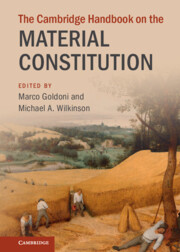Book contents
- The Cambridge Handbook on the Material Constitution
- The Cambridge Handbook on the Material Constitution
- Copyright page
- Contents
- Contributors
- Introduction
- Part I History
- 1 The Tradition of the Material Constitution in Western Marxism
- 2 The Soul of the State
- 3 Laski’s Materialist Analysis of the British Constitution
- 4 Rudolf Smend’s Legacy in German Constitutional Theory
- 5 The Constitution in the Material Sense According to Costantino Mortati
- 6 The Material Constitution of the Dual State
- 7 ‘A Certain Shadowy Totality’
- 8 The Material Constitution in Greek Constitutional Thought
- 9 The Constitution As Social Compromise
- 10 ‘Self-Justifying Law of Constitutional Law’
- Part II Challenges
- Part III Analyses
- Index
5 - The Constitution in the Material Sense According to Costantino Mortati
from Part I - History
Published online by Cambridge University Press: 15 January 2023
- The Cambridge Handbook on the Material Constitution
- The Cambridge Handbook on the Material Constitution
- Copyright page
- Contents
- Contributors
- Introduction
- Part I History
- 1 The Tradition of the Material Constitution in Western Marxism
- 2 The Soul of the State
- 3 Laski’s Materialist Analysis of the British Constitution
- 4 Rudolf Smend’s Legacy in German Constitutional Theory
- 5 The Constitution in the Material Sense According to Costantino Mortati
- 6 The Material Constitution of the Dual State
- 7 ‘A Certain Shadowy Totality’
- 8 The Material Constitution in Greek Constitutional Thought
- 9 The Constitution As Social Compromise
- 10 ‘Self-Justifying Law of Constitutional Law’
- Part II Challenges
- Part III Analyses
- Index
Summary
Costantino Mortati theorised the material constitution as the ‘grey area between law and politics’. This space is the source of all normativity and is comprised of two fundamental features: the essential content and the normative material elements. Both arise from and reflect the material relations present in society. Further, the formal aspect of the constitution, the text of the law, is a by-product of any given configuration of such material relations. The implication of Mortati’s focus on the ‘constitution in the material sense’ is his extensive theorisation and active promotion of means of popular participation suitable to uphold the material constitution and keep its relationship to the formal aspects of law active and dynamic.
- Type
- Chapter
- Information
- The Cambridge Handbook on the Material Constitution , pp. 89 - 99Publisher: Cambridge University PressPrint publication year: 2023

